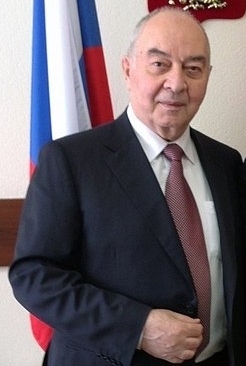Doku Zavgayev | |
|---|---|
Завгаев Доку | |
 Zavgayev in 2013 | |
| Head of the Chechen Republic | |
| In office 24 October 1995 – March 1996[1] | |
| Preceded by | Salambek Khadzhiyev |
| Succeeded by | Sanaki Arbiyev |
| First Secretary of the Communist Party of the Checheno-Ingush ASSR | |
| In office 1 July 1989 – 6 September 1991 | |
| Preceded by | Vladimir Foteyev |
| Succeeded by | Position abolished (Dzhokhar Dudayev as President of Ichkeria) |
| Chairman of the Supreme Soviet of the Checheno-Ingush ASSR | |
| In office March 1990 – 6 September 1991 | |
| First Secretary | Himself |
| Preceded by | Khazhbikar Bokov |
| Succeeded by | Lecha Magomedov |
| Personal details | |
| Born | 22 December 1940 Beno-Yurt, Checheno-Ingush ASSR, Russian SFSR, Soviet Union (now Chechnya, Russia) |
| Political party | Communist Party of the Soviet Union (until 1991) |
Other offices
| |
Doku Gapurovich Zavgayev (Russian: Доку Гапурович Завгаев; Chechen: Завгаев Доку; born 22 December 1940) is a Soviet and Russian diplomat and politician from Chechnya. He was the leader of the Checheno-Ingush ASSR.
Communist leadership
[edit]In 1989, Zavgayev, a former collective farm manager and senior Communist Party official, was elected as the first Chechen First Secretary of the Checheno-Ingush ASSR since the Chechens' return in 1957.[citation needed]
In August 1991 Zavgayev, then communist leader of the Checheno-Ingush ASSR, supported the 1991 Soviet coup d'état attempt against Soviet President Mikhail Gorbachev.[2]
On 6 September 1991, supporters of the All-National Congress of the Chechen People (NCChP) led by Dzhokhar Dudayev, stormed a session of the Chechen-Ingush ASSR Supreme Soviet, killing the Soviet Communist Party chief for Grozny, Vitaly Kutsenko, severely injuring several other Soviet members, and establishing the Chechen Republic of Ichkeria. Zavgayev, the Chairman of the Soviet, was not present. Trying to avoid further bloodshed he was compelled to leave the republic, publicly announcing that he would return.
First Chechen War
[edit]By 1994, both the president of Russia, Boris Yeltsin and the heads of the "force ministries" were convinced by Zavgayev that Russia should actively intervene in Chechnya. Zavgayev was appointed a pro-Moscow head of state on 24 October 1995, and was elected in December the same year with 96% of the votes.
On 8 December 1995, Zavgayev and Viktor Chernomyrdin signed an agreement as a basis for a Russian-Chechen federation treaty which would give Chechnya broad autonomy akin to that of Tatarstan.
Postwar career
[edit]After the 1996 withdrawal of the Russian forces from Chechnya, Zavgayev was appointed Russia's ambassador to Tanzania. From February 2004 he was Deputy Foreign Minister and he was Director General of the Russian Ministry of Foreign Affairs from August 2004 to September 2009. From September 2009 to November 2019 he was Russia's ambassador to Slovenia.[3]
Notes
[edit]- ^ "Хроника вооруженного конфликта. 1995. Октябрь" [Chronicle of a military conflict: October 1995]. Memorial (society) (in Russian). Archived from the original on 25 December 2016. Retrieved 15 August 2023.
- ^ Krechetnikov, Artem (10 December 2009). "Первая чеченская: путь к войне" [Chechnya I: The Road to War]. BBC (in Russian). Retrieved 15 August 2023.
- ^ "Home". 2 March 2020.